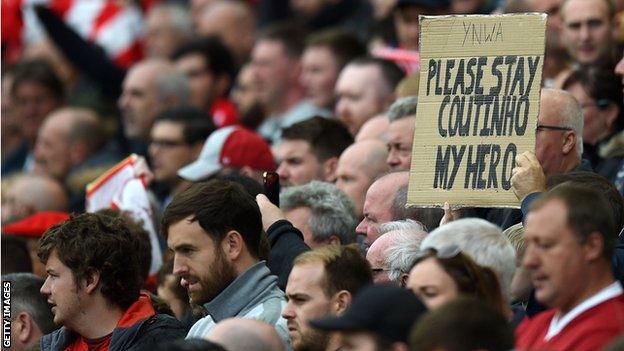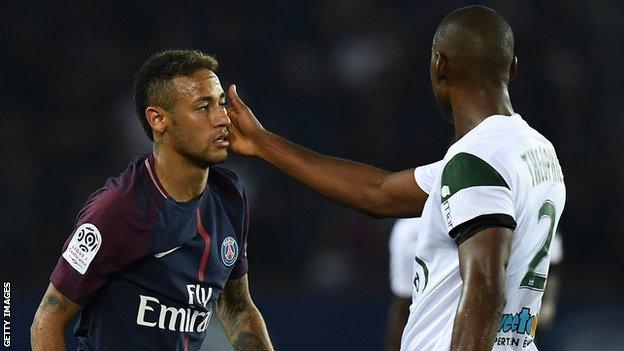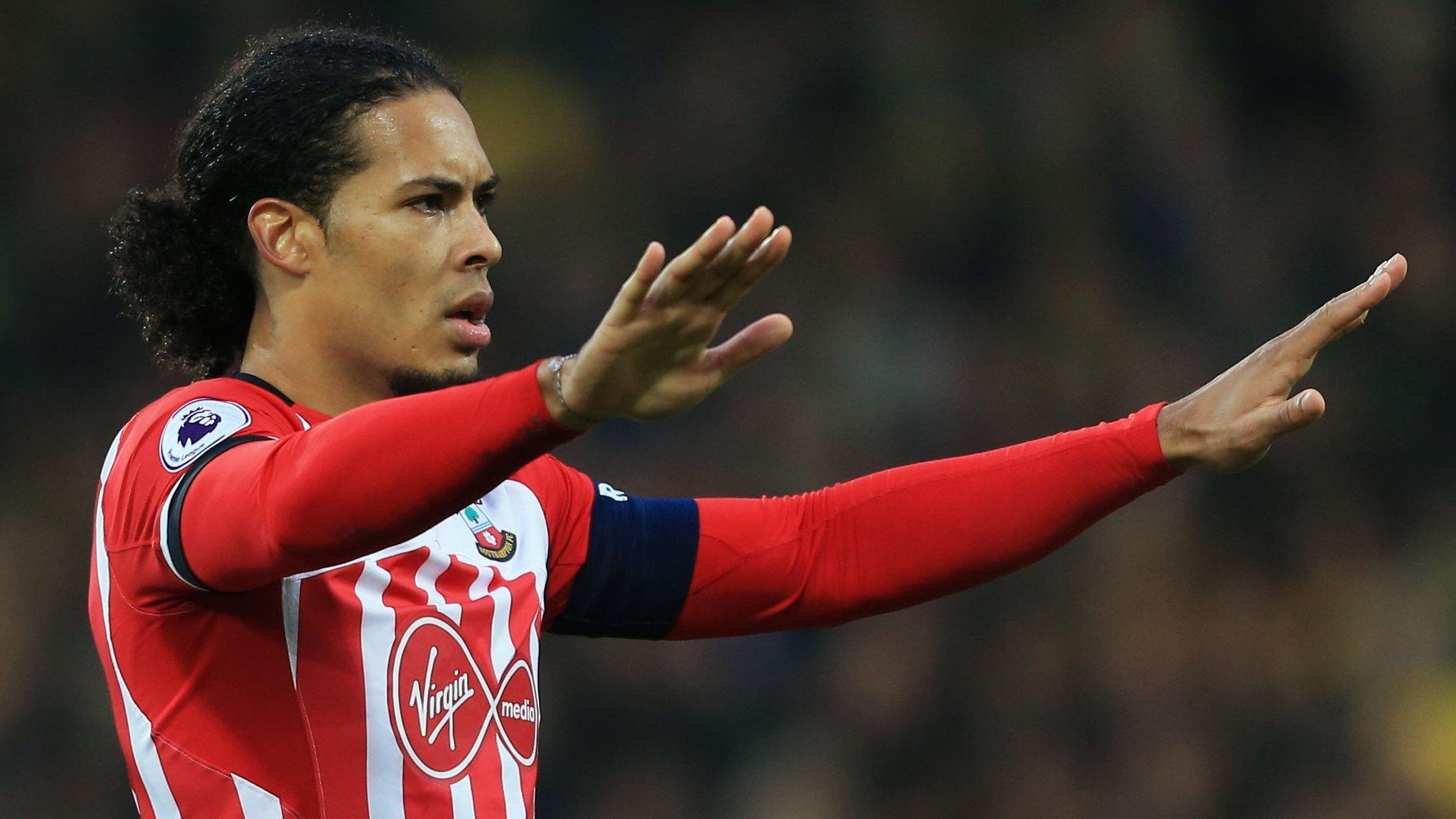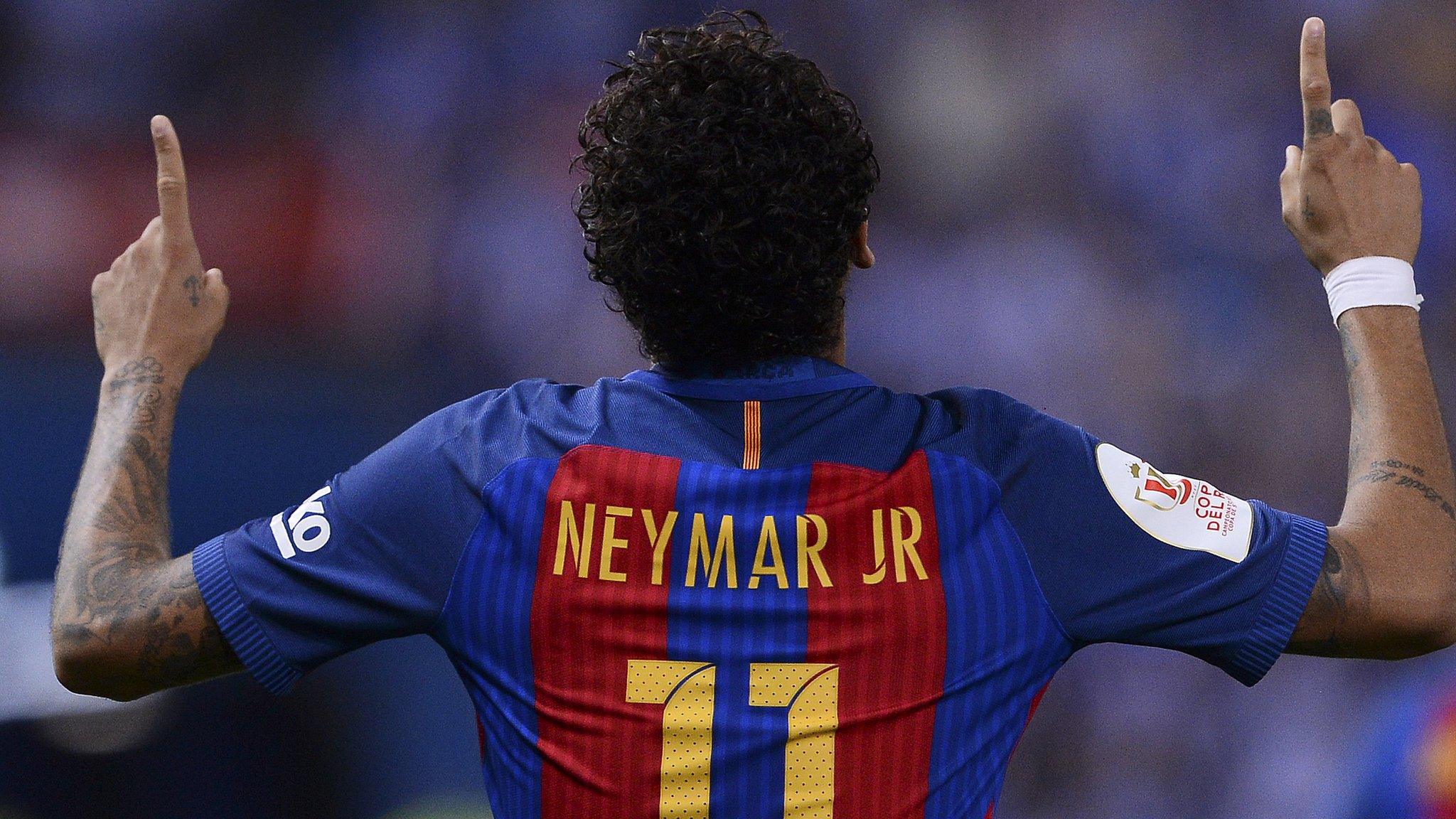Football transfers: Is there another way? Or would we miss them too much?
- Published

Neymar and Ousmane Dembele have already sealed big-money moves this summer
It is a world of wonder, conspiracy and riches, regulated by three sentences.
Fifa's rules on 'tapping up' - approaching a player without a club's permission - have been routinely ignored for such a long time that, within the game, they are not given a moment's thought.
In fact, doing anything but the opposite of what they say is thought to be "a waste of time", and no-one seriously complains,, external because everybody is complicit.
But if the rules are always broken, why do they exist? Could they be changed? And what about the idea of getting rid of transfers altogether? Would we just miss the drama too much?
Tapping up - why do clubs do it?
The concern among football's lawmakers appears to be that, if restrictions were lifted, it would lead to a free-for-all, with players moving every few months.
But, as Mike Rigg, a former sporting director at Manchester City, QPR and Fulham, says: "If Fifa were to examine every breach, they'd have to investigate 99.9% of transfers.
"In 30 years of football I have never, ever, met any person at any club who stands by Fifa's rules on tapping up."
There are two reasons for this, he explains. One is that, by revealing interest to the club first, a buyer puts themselves in a weaker negotiating position. The other is what's the point in bidding for a player who has no desire to leave, and who actually might not be what the club is looking for?
"I've approached clubs in the past and their first response has been: 'Have you spoken to the player?'" Rigg adds.
"When you reply: 'Erm, no...' because you're not supposed to have, they're actually angry with you and say: 'Well why not?!' They think you're wasting their time."
So how does it work, exactly?
"Simple," says Rigg. "You call the agent."
Jesse de Preter, agent and director at Atticus Sports Management, says "99% of the transfers I deal with happen this way".
He explains: "Because a club is not allowed to talk to a player, they put two or three individuals in the way so it cannot be traced directly to them.
"Often they will go to their own agents, who will contact a player through another agent, to be sure it all takes place out of reach of the club. That way, if it blows up in their face, they can just say it is all between agents.
"Or, sometimes a club will just call the agent directly - if they are trusted. Either way it is unavoidable. And it is naive to think that, in a cynical business like football, recruitment would be handled in a more ethical way."
What if a club still says no?

Liverpool have rejected three bids from Barcelona for their Brazil international Philippe Coutinho
Even if a club does manage to persuade a player to join in principle, a fee must still be agreed.
So what if you refuse to sell? What is the buying club's next move?
"Even if you plead with them to stop bidding, a buying club is like a dog with a bone," Rigg says. "They will just think about how they can go about changing a club's mind. Often that boils down to 'let's get stuck into the player'.
"Players used to come in to my office and say they'd never play for the club again, bringing out all sorts of excuses to make life really difficult for you to keep him.
"Every club has their strategy of trying to entice, encourage and schmooze. And if the player is going in every day to see the coaches, the chief executive, telling them he wants to go, that becomes very uncomfortable to deal with."
So what are the rules - and what could change?
Fifa regulation 18.3, on the status and transfer of players, states:
A club intending to conclude a contract with a professional must inform the player's current club in writing before entering into negotiations with him. A professional shall only be free to conclude a contract with another club if his contract with his present club has expired or is due to expire within six months. Any breach of this provision shall be subject to appropriate sanctions.
Fifa says it does not have exact figures on how many 'tapping up' incidents are reported, but it describes the total as "very limited".
Clearly this is not because it does not go on. So shouldn't the rules be scrapped? Or might that not be enough?
De Preter believes that "the entire transfer system is a complete nonsense", and advocates abolishing transfer fees entirely - "as soon as possible, to make the business totally clear".
His alternative model would essentially see every player assigned a release clause, which would be determined by a third party - perhaps a governing body, or a special tribunal. The value would be based on various factors, including age, performances and potential - and everyone would be able to find out what it is.
"If you wanted to leave a club, you would have to give notice, like a normal employee, and then there would be this termination fee," De Preter explains.
"Then, it is up to the player to choose the club that is most interesting to him. It may be the club that pays him the most, the best sporting option, or maybe he would choose the best quality of life.
"You have just an employee who changes jobs because he wants to go somewhere else."
Football agents: Are they worth £220m?
'Bad people with bad intentions'
But the biggest benefit, De Preter argues, would see the "not so trustworthy people involved in football" lose some of their influence.
It is clear from the way he suggests it is strange for him to have this opinion, that he is referring - in part at least - to agents.
In 2016, English clubs paid agents £220m - a 38% increase on the £160m handed over in 2015 - and it has been claimed that Paul Pogba's agent - Mino Raiola - will earn £41m from the £89m deal that brought the midfielder back to Manchester United.
Furthermore, Premier League clubs have been known to hire private investigators to help in their transfer dealings.
One such company explained that much of their work involves 'debugging' conference rooms where sensitive conversations are to be held. They perform a search of the room looking for listening devices, remove any they find, and will keep an 'engineer' on site as "added back-up", for an extra fee.
With everything out in the open, so the theory goes, such things would be a thing of the past.
De Preter adds: "People say, OK you are an agent, so why do you say this? It's because I care about football.
"There is a lot of money in an inflated market, and that attracts people with bad intentions. You have to take away the incentive. It is not normal that a club can ask £100m for an employee.
"There is a tragedy about it. The sport will disappear if there is no integrity. Why are these dodgy meetings being helped? It is because the rules are not OK."
But, could we live without transfers?
The intrigue and speculation around transfers never seems to cease, nor does our appetite for it appear to diminish.
You might think that compiling the BBC Sport gossip column on the morning after the transfer window has closed would be a desperate task. Not so. It will be full of entries about clubs' plans for January.
And this summer it feels like the trend is growing still.
Clubs have been producing elaborate self-referential videos in sometimes quite bizarre celebration of their latest signings. The word 'announce' seems to have a taken on a new relevance, focussing frustrated fans' appeals for more money to be spent and not, as Tottenham defender Danny Rose said, on players you have to Google.
In the latest annual version of EA Sports' Fifa video game, to be released in September, players can simulate transfer negotiations with a player and his representative. In a virtual boardroom, you can haggle over wages, appearance fees and release clauses.
How long will it be before games such as Fifa, and its rival Pro Evolution Soccer,, external give players the option to arrange a clandestine meeting with Marco Asensio?

Anyway, is change likely to happen?
There was a big change in the way transfers are regulated as recently as 2015, when Fifa introduced new laws banning third-party ownership (TPO) - when investors effectively own a share of a player.
Also in 2015, world players' union Fifpro brought a legal challenge to the European Commission, arguing for alterations in the way the transfer market works.
High on their list was improving the "reciprocity of rights" between club and player. Essentially they wanted to give players greater legal protection if clubs renege on their contracts, or fail to pay their wages.
But Fifpro also argued that transfer fees in general are a tax on employment, a restraint of trade that should be illegal under EU law.
Following Neymar's world record transfer to Paris St-Germain, Fifpro called on the European Commission to revisit its complaint.
"Football's wealth is trapped within a few leagues and clubs when it could be redistributed to help protect competitive balance," said its general secretary Theo van Seggelen, who described Fifa's transfer rules as "anti-competitive, unjustified and illegal".
In May, FA chairman Greg Clarke said football needed a debate about how agents work, while Fifa boss Gianni Infantino has called for more transparency around transfers.
More recently, some Premier League clubs have said they want to vote on closing the summer transfer window before the season starts.
So some change could be in the offing. But as of now, we are still smiling in the dark.

Neymar has scored three goals and provided three assists in his first three games for PSG
- Published15 August 2017

- Published3 August 2017
